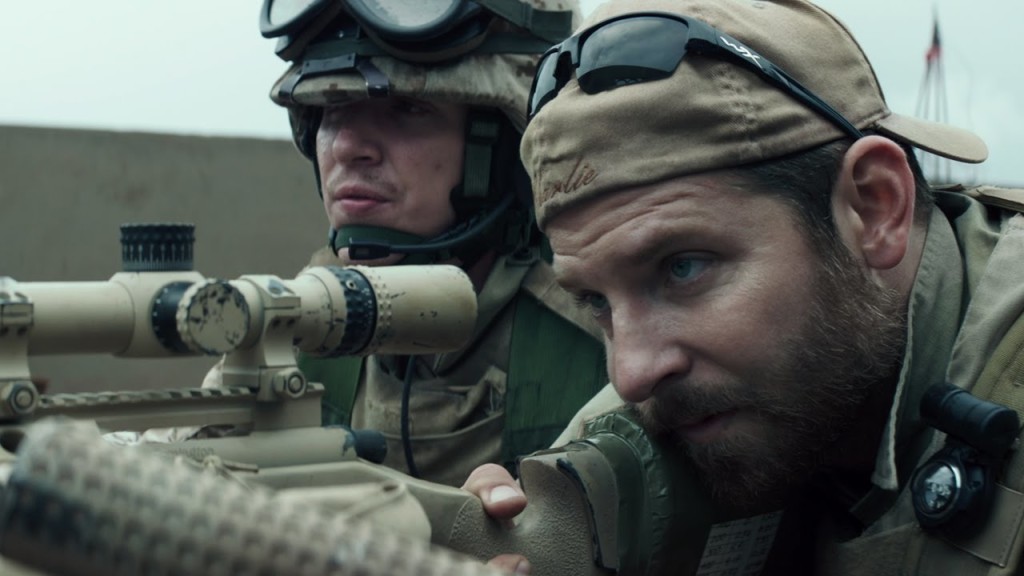Appropriately for the 4th of July, I watched American Sniper, the latest Clint Eastwood opus. However, I can’t say I really loved it or hated it. You might imagine that comes from Eastwood’s workmanlike direction and clear framing of the plot, or maybe just the overall banality of the script, but I think the problem lies far deeper.
Chris Kyle remains a controversial figure in political circles in America. If you happen to lean towards the right (or, coincidentally, live in Texas), you might think him a war hero. The “legend” of sniping, far as we know, claims the most sniper kills in United States military history with over 160 confirmed kills. You might also know him as a devout family man, patriot, and Christian who believe that he fought literal, true evil over in Iraq. Even after his war record, he still went to help veterans cope with the aftermath of their horrific experiences overseas, helping the least of these. Here’s one quote exemplifying that, problematic as it might seem:
I am a strong Christian. Not a perfect one—not close. But I strongly believe in God, Jesus, and the Bible. When I die, God is going to hold me accountable for everything I’ve done on earth. He may hold me back until last and run everybody else through the line, because it will take so long to go over all my sins. “Mr. Kyle, let’s go into the backroom. . . .” Honestly, I don’t know what will really happen on Judgment Day. But what I lean toward is that you know all of your sins, and God knows them all, and shame comes over you at the reality that He knows. I believe the fact that I’ve accepted Jesus as my savior will be my salvation. But in that backroom or whatever it is when God confronts me with my sins, I do not believe any of the kills I had during the war will be among them. Everyone I shot was evil. I had good cause on every shot. They all deserved to die.
On the other hand, if you happen to draw towards the left, you see Chris Kyle as exactly what’s wrong with America: religious extremism, resurrected imperialist ethics, a perverted form of Christian and state worship by the masses drawn to a hero “just like them”, and perhaps subtle forms of racism. Quotes from the man himself don’t help his case, given that they often exude the typical things people hate about such military heroes: enjoyment, pride in their work, and also saying politically incorrect things like this:
I only wish I had killed more…I loved what I did…it was fun. I had the time of my life.
Or, take this one:
I don’t shoot people with Korans – I’d like to, but I don’t.
In any event, whatever side you fall, Chris Kyle usually riles somebody up in the audience, and anyone who wants to fight about whether he was a hero or a Crusader or an evil vehicle of the Roman Empire resurrected through America (!?) will certainly get one. The point is that the man himself remains divisive, and we seek to debate whether or not he should fit into American history as a sad example of our violent culture or, in fact, a defender of Western freedoms. I mean, how much more interesting a subject could you craft into film?
Unfortunately, American Sniper the movie just doesn’t have much to say on the subject either way. The film proceeds through the bare facts of his life with all the excitement of rigor mortis. Here is the relationship with his girlfriend/wife and that of the war itself; here are some other things. The generic nature of it all just kills me. It uses little things like tiny New Testaments or rifles as symbolism, or Kyle’s total focus on warfare and combat. It masquerades a little as a PTSD war story, but never goes there, and also want to use the extensive (and I do mean EXTENSIVE) combat scenes to show how much he really did focus on the war versus his family. It also almost completely ignores the Christian elements in the book, other than vague intimations towards evil actions by bad men. It sounds really strange that he never, in the film, states any kind of belief in God directly, since it’s clear he was a overt Christian with a giant red cross tattooed on his arm. All in all, American Sniper does not want to say anything specific; rather, it dabbles in generalities. I think of it like I think of the most boring of biopics – it fails to capture anything of note.
I would wager Clint Eastwood intentionally made the film itself rather milquetoast so that people with varying opinions could draw and feed off what they personally liked or disliked about the man (not to mention Bradley Cooper’s unbelievable method acted performance). Otherwise, Eastwood himself would earn accusations of American hero worship, or disparaging an American hero, or some-such thing. Whether or not that’s the case, this is the impression I get, and I don’t think that will make American Sniper last as a work of art. Or, you might say, it’s an excellent acting exercise for Bradley Cooper trapped in a super generic film about sniping.
Still, as a pure Iraq War action movie with interspersed character development, the whole enterprise remains suitably tense, fast, engaging, and unerringly clear; I just wish I had something to think about when I stopped watching it.
Also, in a weird aside that totally threw me out of the movie for about 10 seconds, real-life sniping skills do not translate to gallery shooting games at all. That was dumb, why did they put that in the movie?

